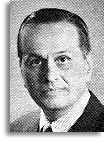
 In less than 10 years, Hatim A. Tyabji, a UB alumnus with nearly
religious convictions about how to run a business, has increased annual
revenues 10-fold at the international telecommunications company where
he serves as CEO. The company, VeriFone, Inc. of Redwood City, Calif.,
was dubbed "the fastest-growing small company in the nation" by Forbes
Magazine.
In less than 10 years, Hatim A. Tyabji, a UB alumnus with nearly
religious convictions about how to run a business, has increased annual
revenues 10-fold at the international telecommunications company where
he serves as CEO. The company, VeriFone, Inc. of Redwood City, Calif.,
was dubbed "the fastest-growing small company in the nation" by Forbes
Magazine. On Friday, April 4, Tyabji, who earned a master's degree in electrical engineering from UB in 1969, will share the secrets of his success at a breakfast program at his alma mater.
The breakfast and talk will run from 7:30-9 a.m. in the Center for Tomorrow on the North Campus. At the breakfast, Tyabji will receive a UB Distinguished Alumni Visitor award.
The talk, which is open to the public, will be sponsored by the UB Alumni Association. The cost will be $12 for members of the association; $15 for all others. Reservations may be made by calling the UB Office of Alumni Relations at 829-2608.
Currently the world leader in transaction automation systems, which retailers use to verify credit-card purchases, VeriFone is positioning itself to lead the emerging markets that will make shopping on the Internet and banking from home truly convenient and secure.
Thanks to "smart card" and Internet commerce technologies that VeriFone is pioneering, consumers in the not-too-distant future should be able not only to pay bills electronically, but to download cash directly from home, using a "personal Automatic Teller Machine."
Tyabji has attracted international recognition for transforming VeriFone from a small, not-very-profitable company to a market leader and for engendering a unique-and remarkably ubiquitous- corporate culture.
He is credited with having created what could be the world's first truly virtual corporation: He has all but banned paper and made e-mail the primary mode of communication; corporate functions are decentralized, and executives live wherever they want, unbound by the concept of a corporate headquarters.
In 1986, Tyabji, then a vice president at Sperry Corp., was recruited to take over VeriFone as chief executive officer. At that point, the company had yet to see a significantly profitable year. Tyabji instituted a bold business plan that stressed low cost, high value, high reliability and high volume and the company began a radical turnaround. In 1988, its sales began growing at an annual average rate of 25 percent and profits have grown even faster.
VeriFone is considered a prime example of the principles espoused by management guru Stephen Covey, which stress the relationships between the personal, interpersonal, managerial and organizational levels of a company.
The company's corporate philosophy, which Tyabji wrote, stresses personal responsibility, open communications (employees may reach the entire company through e-mail-anonymously, if desired) decentralization, a blending of personal and corporate life for its employees and a deep commitment to working in the global marketplace.
Tyabji has achieved what he calls a "culture of urgency," with VeriFone programmers working around the globe so that the development of new products can continue 24 hours a day.
Company financial data are on-line and accessible to any employee. Sales figures are updated daily.
In spite of the emphasis on electronic communication, face-to-face contact with internal and external customers is emphasized and many VeriFone employees spend up to half their time on the road.
Tyabji earned his master's degree in electrical engineering at UB after graduating from the College of Engineering in Poona in his native India. He also has an MBA from Syracuse University and is a graduate of the Stanford University Executive Program.
In addition to running VeriFone, Inc., Tyabji lectures at the Harvard Business School.